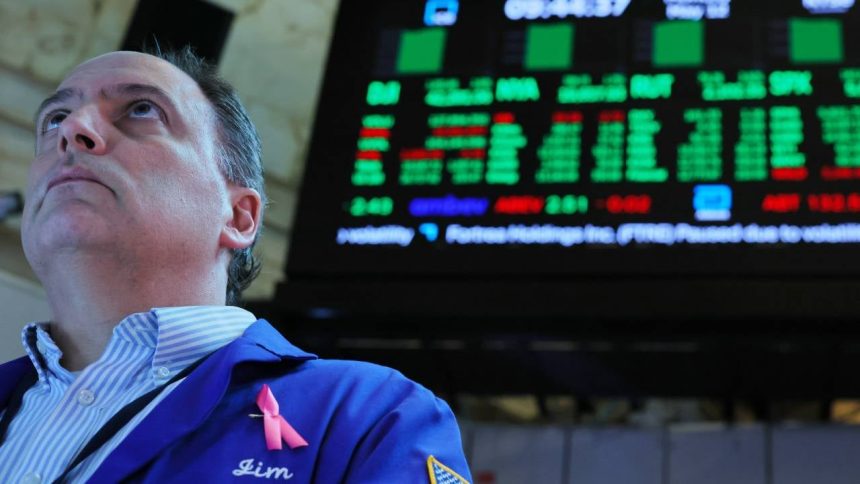The S&P 500 stock index is up about 2 percent this year, while the Nasdaq Composite index has risen 1 percent as of early June. A slow but steady year, you might think, if you’d been asleep since the start of 2025. It’s been anything but that, as both indexes took a huge round trip — the S&P 500 sat down more than 15 percent on the year at one point — just to get their heads back above water for the year.
The cause of that downturn and subsequent rebound? The rollout of President Donald Trump’s tariffs in February and April and the delay of their full implementation. While the stock recovery is nice, higher prices mean that stocks are riskier than they were weeks ago at lower prices, if the facts on the ground are still the same. Some 60 days have already elapsed on a Trump-imposed 90-day pause on the tariffs’ full implementation, with few real deals having been struck with trade partners to avoid the worst of the tariffs. Meanwhile, investors have bid up stocks furiously.
With stocks having rallied hard since April, investors need to be careful, say experts. Here’s what individual investors can do now that stocks look priced for perfection while risks abound.
Stocks rally since the delay in Trump’s tariffs, but risks remain
Stocks have gone on a round trip to start the year, after being thrown for a loop by the announcement of a range of tariffs on U.S. trading partners. The carnage began in early February, when Trump announced the levies on America’s top three trading partners — Canada, China and Mexico. But markets really plummeted when the Trump administration imposed global tariffs in the double digits on April 2, what the Trump team called Liberation Day.
Markets promptly swooned the following week, until Trump announced a delay in the tariffs. For the moment, that announcement marked the bottom of the market. While stocks aren’t quite at their 52-week highs now, they’re not all that far away, despite huge outstanding risks, such as high stock valuations, an explosive tariff situation and its effects on inflation and interest rates.
“The S&P 500 currently trades at 22 times forward earnings, a historically elevated valuation,” says Corbin Grillo, CFA, director of investment strategy, Linscomb Wealth. “Even if the tariff turmoil subsides, investors have high expectations for corporate performance, raising the risk that companies fail to meet those lofty outlooks.”
If the tariff issue continues to fester, however, it raises the odds that corporate earnings won’t meet these high expectations, potentially hurting stocks, Grillo says.
Tariffs are central to much of the uncertainty, raising questions — how high, how soon, how many countries — that are central to the performance of publicly traded companies. So much hinges on how they’re resolved, but it’s not clear that even the Trump administration knows how it intends to conclude the brouhaha that it started.
“Tariff rhetoric has not disappeared, and I believe the market is too complacent on potential long-term solutions,” says Edison Byzyka, CFA, chief investment officer, Credent Wealth Management.
The tariffs also make the job of the Federal Reserve harder, as the central bank calibrates interest rates to balance the risks of inflation against unemployment and a slowing economy. But tariffs have the potential to raise inflation even as they hurt employment, confounding the Fed’s decision to lower rates. This tension means the Fed may need to keep rates higher to fight inflation while employment and the economy suffer. If the Fed gets things wrong and lowers rates too soon, inflation could begin to rise again — a scenario that investors don’t want to see.
Investors have been watching for lower rates, because they help boost the stock market, but the timeline for the Fed to lower rates keeps being delayed due to the uncertainty of the tariffs.
The Fed remains in “wait-and-see” mode while it watches the tariffs’ effects, say experts.
Consumers expect rising inflation over the coming year — 6.6 percent — according to a University of Michigan study. “Such a reading is by far the most impactful sign that the real economy has yet to surpass the threat of inflation,” says Byzyka. “Not only does this create additional uncertainty for businesses, but it would also hinder the Fed’s ability to lower interest rates.”
So, stocks sit close to all-time highs while the tariff issue remains unresolved, and it’s not clear that the Trump administration has a real plan to resolve it in an orderly way. While some traders have engaged in what’s being referred to as the TACO trade — short for “Trump always chickens out” — and calling the president’s (and market’s) bluff, they seem to be running plenty of risks doing so.
What should individual investors do in a volatile market?
Market volatility can truly throw individual investors for a loop, as they watch the gyrating market reduce the value of their hard-earned cash in days or weeks. It’s tough to see your account balances plunge while your contributions flow in at what seems like a trickle in comparison.
Here’s what investors should consider doing in this situation.
Stick to your long-term plan
Experts routinely advise investors who have years before they need to tap their accounts to stay the course on their investments. If you don’t need to use retirement accounts such as a 401(k) or IRA in the next few years, it can make sense to stick with your long-term investing plan.
“Trying to time the market as an individual investor is a fool’s errand,” says Greg McBride, CFA, Bankrate chief financial analyst. “It isn’t about being right once. You have to be right twice. You have to be right about the time to get out and right about the time to get back in.”
Plus, if you sell a profitable investment in a taxable account, you’re locking in a tax liability. In the meantime, the market may rebound much faster than you expect, leaving you on the sidelines — for example, the situation in early 2020 with the emergence of COVID and in the last few weeks with tariffs.
“Many investors who exited the equity market during the depths of 2020 have never fully re-entered their positions, which makes for an impossible game of catch-up and regret,” says Byzyka.
“Look at what has happened since early April — a sharp downdraft that flirted with bear market territory, only to be followed by a 20 percent rebound in the ensuing eight weeks, one that nobody predicted or saw coming,” says McBride.
The S&P 500 stock index has a long track record of strong returns, averaging about 10 percent annually over long periods. You can capture those returns and outperform more than 90 percent of investors over time by investing in an S&P 500 index fund — but you must stay invested.
“Selling out of stocks or other assets held for long-term appreciation is often the wrong move,” says Grillo. “Periods of market volatility are inevitable. They are the price investors pay for long-term gains.”
Investors have a notably bad habit of buying high, when the market feels safe, and selling low, when it feels much riskier. Of course, that’s exactly the reverse of what savvy investors do.
Add regularly to your accounts
None of this is to say that investors should do nothing at all. For investors with a long time horizon — a lot of time before they need to tap their investments — it can make sense to continue adding to investments regularly. For example, 401(k) investors can keep making their biweekly contributions pulled right from their paycheck and avoid the risk of emotional decision-making.
Consider rebalancing the investments in your account
Other investors may opt to rebalance their portfolios if their target allocations move out of whack. Often, that would mean selling bonds that have fallen less and buying more stocks, which have fallen further, in order to bring the allocation back in line. Those who are still working and adding fresh cash to their account could decide to add only to their stock position to bring it back in line.
Reassess your financial plan with a financial advisor
Still, other investors may decide it’s time to truly reassess their investment plan, figuring out belatedly that they have too much exposure to one area or another. But what the move should not be is a reactive, after-the-fact decision due to the market’s volatility. Working with a financial advisor can help you make smart decisions that reflect your needs and not merely your fears.
“It may be appropriate to change a portfolio’s long-term allocation if an investor’s goals, required return, or risk tolerance has changed,” says Grillo.
Scan the market for stocks on sale
And for those who are buying individual stocks and looking to be more opportunistic when the stock market puts on a sale? They may smell profit when stocks dip or enter a bear market. Byzyka thinks the market will serve up plenty more volatility over the coming two or three years, and that investors will have “immense opportunities” to take advantage of it.
“There remains an abundance of healthy companies with healthy margins that will weather the storm,” says Byzyka. But he emphasizes, “The long-term financial plan is by far the most important thing to focus on.”
Bottom line
So, while stocks look like they may be overpriced now, that doesn’t necessarily mean that individual investors should go out and sell them. Instead, sticking to the long-term, buy-and-hold approach in a diversified portfolio of stocks, such as an S&P 500 index fund, has proven to be a winning strategy that ends up beating most active investors over time — if you can hold on for the ride.
Editorial Disclaimer: All investors are advised to conduct their own independent research into investment strategies before making an investment decision. In addition, investors are advised that past investment product performance is no guarantee of future price appreciation.
Read the full article here
















